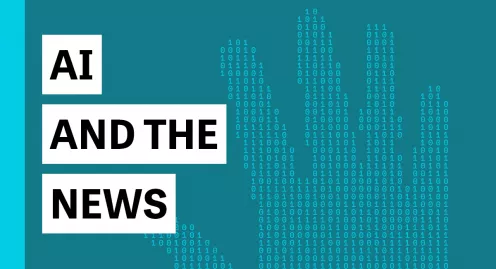
Announcing the Winners of the AI and the News Open Challenge
Seven projects today are receiving $750,000 to explore and shape the impact that artificial intelligence is having on the field of news and information.
The projects will tackle a variety of problems, including:
- Confronting bad actors spreading misinformation through messaging platforms;
- Equipping journalists with the technology they need to quickly sift through reams of information;
- Tackling emerging threats posed by AI-generated fakes, and more.
The challenge is a project of the Ethics and Governance of AI Initiative, a partnership with the MIT Media Lab and the Berkman Klein Center, funded in part by Knight Foundation.
Learn more on the initiative's website.
The seven winners of our $750,000 challenge represent a portfolio of incredible organizations seeking to attack these problems from a number of different angles:
Chequeado - Chequeado, a veteran fact-checking organization based in Argentina, will be launching a new investigative series on the ethics of algorithms and the implications of automated decision making for Latin America.
Craig Newmark Graduate School of Journalism - Sandeep Junnarkar and his team at CUNY will be launching a program that trains community media journalists to uncover and analyze machine learning systems, with an eye towards producing a series of news pieces looking at the impact of these technologies on immigrants and low-income communities.
Seattle Times - The Seattle Times will run a year-long reporting project focused on the implications of machine learning and automation on work and labor. The project will aim to connect broader technological trends with the near-term, practical questions of who gets the gains from these technologies and how they are distributed.
MuckRock Foundation - The MuckRock Foundation will be building on its long-standing public records requests platform to launch Sidekick, a toolkit of machine learning classifiers that will support newsrooms and researchers in meeting the challenge posed by sifting through massive government document dumps.
Legal Robot - Legal Robot will develop a tool that will apply machine learning to quickly extract structured data from government contracts. This engineering effort will be paired with a campaign to request millions of city, county and state-level contracts from around the United States.
Tattle Civic Technologies - Tarunima Prabhakar and her team at Tattle will build a tool to support the efforts of fact-checkers working in India, specifically targeting the challenge of addressing misinformation on the WhatsApp platform. The tool will experiment with using machine learning for tasks like language detection and image matching, which are frequently needed in the fact-checking process.
Rochester Institute of Technology - Matt Wright and his team at RIT will experiment with techniques to assist researchers and the public in identifying evidence that a given piece of video or audio is a fake generated via machine learning. These techniques will then be field tested with journalists and media forensics experts who are on the frontlines of identifying and evaluating media “in the wild.”
Read more coverage of this announcement in Poynter, Nieman Lab, and TechCrunch.